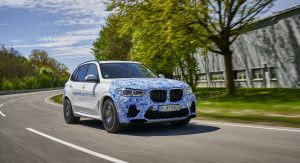Global Push for Hydrogen Fuel Cell Cars
Audi, BMW & Daimler Making Major Hydrogen Pushes
Source: BMW Hydrogen SUV
Europe Joining Japan, South Korea & China in Development of Green Hydrogen Cars
Big German automakers, including BMW and Audi, are betting that hydrogen fuel cell technology is extremely important to the future of driving, along with battery electric cars. The current global consensus is that electric battery vehicles, your current and future EV, are the primary key to the near term, global automotive future. But the new twist from top automotive executives is the growing support building around the upcoming emergence of hydrogen powered cars, which are clean, zero emissions and much quicker to re-fuel. BMW and Audi, in particular, are ramping up their hydrogen vehicle development plans. They know that EVs remain a big part of the nearer zero emissions future and are building a portfolio of EVs. But they are signing on to a longer term strategy that hydrogen fuel cell vehicles are the long term future of zero-emissions driving.
BMW Hydrogen Plans
BMW and Audi are developing a fleet of hydrogen fuel cell prototype vehicles as they prepare for a fossil fuel-free future to meet new Climate Change targets, particularly in Europe and China. The biggest supporter among the big German automakers is BMW, which expects to have a mass market hydrogen model to sell by 2030. BMW has developed a prototype hydrogen car that's based on the X5 SUV. In the hydrogen prototype, the hydrogen is stored in two, 700-bar tanks, that can hold 6 kilograms of hydrogen. The tanks are made of carbon-fiber-reinforced-plastic or CFRP. And, BMW says it will test a fleet of 100 hydrogen prototype cars in 2022. BMW is not alone in its pursuit of hydrogen fuel cell cars.
Audi Joins the Hydrogen Development Ride
VW's luxury brand Audi has a team of more than 100 engineers and researchers who are developing hydrogen fuel cell technologies for the entire VW group. They have built a few hydrogen prototype vehicles. Audi and VW join Japan's Toyota in developing hydrogen vehicles. Toyota is certainly a true believer. It is building a hydrogen based city at the base of Mount Fuji and has a hydrogen fuel cell car on sale in niche markets. In South Korea, Hyundai is forging ahead with the development of hydrogen fuel cell vehicles. So too, is Nissan in Japan. But the drag on the current deployment of hydrogen powered cars is the expensive cost of the technology, which includes high cost metals, and the global lack of infrastructure to fill-up the h-cars with hydrogen.
China's Hydrogen Moves
China is on a hydrogen road to change the lack of hydrogen infrastructure. It is greatly expanding its hydrogen fueling station infrastructure. And several Chinese automakers including Great Wall Motors are now developing hydrogen SUVs.
Daimler Hydrogen Trucks
Daimler Mercedes Benz has an interesting hydrogen strategy. It is investing in and developing hydrogen fuel cell technologies for its big truck division. In fact, it is investing heavily in using hydrogen fuel cells to fuel big rigs because lithium-ion batteries are too heavy to support electric trucking on long hauls. The Daimler hydrogen truck technology is expected to convert into consumer market car technology and bring costs and economies of scale to market scale levels for hydrogen powered consumer market cars. That would bring the horizon of hydrogen driving for consumers into a faster and most affordable place. The big sales jump for hydrogen cars is expected by 2035. But the R&D and sharp focus on hydrogen vehicles that is happening in the global market right now is fascinating and relentless. To take a look at many more new vehicle innovations, go to https://read.amazon.com/kp/embed?asin=B08YTGFCG2&preview=newtab&linkCode=kpe&ref_=cm_sw_r_kb_dp_RV3DG397BQNPZAKGBGZ2






Comments
Post a Comment